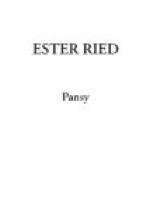Ester merely shook her head in answer. She could not look in those earnest blue eyes and say that she had never, by word or act, asked him to come to Jesus.
“Well, that is what I mean; you have so much more chance than I, it seems to me. Oh, my heart is so heavy for Ralph! I am all alone. Ester, do you know that neither my mother nor my father are Christians, and our home influence is—; well, is not what a young man needs. He is very—gay they call it. There are his friends here in the city, and his friends in college,—none of them the style of people that I like him to be with,—and only poor little me to stem the tide of worldliness all around him. There is one thing in particular that troubles me—he is, or rather he is not—,” and here poor Abbie stopped, and a little silence followed. After a moment she spoke again: “Oh, Ester, you will learn what I mean without my telling you; it is something in which I greatly need your help. I depend upon you; I have looked forward to your coming, on his account as well as on my own. I know it will be better for him.”
Ester longed to ask what the “something” was, and what was expected of her; but the pained look on Abbie’s face deterred her, and she contented herself by saying:
“Where is he now?”
“In college; coming next week. I long, on his account, to have a home of my own. I believe I can show him a style of life which will appear better to him than the one he is leading now.”
This led to a long talk on the coming wedding.
“Mother is very much disturbed that it should occur in August,” Abbie said; “and of course it is not pleasant as it would be later; but the trouble is, Mr. Foster is obliged to go abroad in September.”
“Who is Mr. Foster? Can’t you be married if he isn’t here?”
“Not very well,” Abbie said, with a bright little laugh. “You see he is the one who has asked me to marry him.”
“Why! is he?” and Ester laughed at her former question; then, as a sudden thought occurred to her, she asked: “Is he a minister?”
“Oh dear no, he is only a merchant.”
“Is he a—a Christian?” was her next query, and so utterly unused was she to conversation on this subject, that she actually stammered over the simple sentence.
Such a bright, earnest face as was turned toward her at this question!
“Ester,” said Abbie quickly, “I couldn’t marry a man who was not a Christian.”
“Why,” Ester asked, startled a little at the energy of her tone, “do you think it is wrong?”
“Perhaps not for every one. I think one’s own carefully enlightened conscience should prayerfully decide the question; but it would be wrong for me. I am too weak; it would hinder my own growth in grace. I feel that I need all the human helps I can get. Yes, Mr. Foster is an earnest Christian.”
“Do you suppose,” said Ester, growing metaphysical, “that if Mr. Foster were not a Christian you would marry him?”




